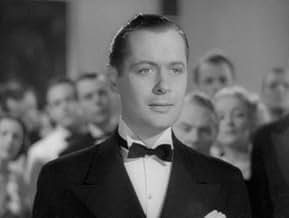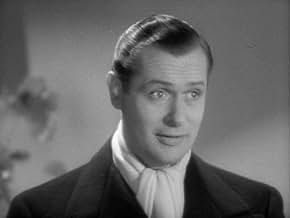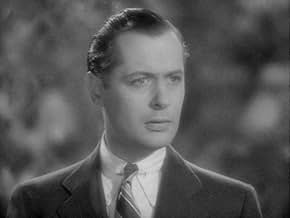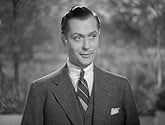Agrega una trama en tu idiomaA society girl tries to reform her playboy husband by making him jealous.A society girl tries to reform her playboy husband by making him jealous.A society girl tries to reform her playboy husband by making him jealous.
- Dirección
- Guionistas
- Elenco
- Premios
- 3 premios ganados en total
Charles Ruggles
- Edgar
- (as Charlie Ruggles)
Joan Fontaine
- Caroline
- (as Joan Burfield)
John David Horsley
- Duffy
- (as David Horsley)
E.J. Babille
- Desk Clerk
- (as E.J. Babiel)
Jean Acker
- Nightclub Extra
- (sin créditos)
Gertrude Astor
- Nightclub Extra
- (sin créditos)
Clem Beauchamp
- Drunk
- (sin créditos)
Brooks Benedict
- Joe Williams - Bar Owner
- (sin créditos)
Veda Buckland
- Marcia's Maid
- (sin créditos)
Opiniones destacadas
Though the careers of Robert Montgomery, Joan Crawford, and her husband at the time, Franchot Tone's respective careers were not hurt by films like No More Ladies, this was the kind of stuff all three of these players were looking to get out of.
There was a truism at MGM back in its heyday. For films where the men wear tuxedos you first get Robert Montgomery. If he turns it down get Franchot Tone. If it's bad enough for Tone to turn it down God help him, Robert Young is stuck with it. So knowing the pecking order and knowing the billing, you can guess who Crawford winds up with.
Robert Montgomery plays another of those irrepressible womanizing playboys who's sowed enough wild oats to qualify for a farm subsidy. He's decided to settle down with society girl Joan Crawford who has certain ideas about infidelity and how wrong it is. Montgomery behaves at first, but when he uses their perpetually inebriated friend Charlie Ruggles as an alibi that doesn't hold up, Crawford decides on some revenge with Franchot Tone.
No More Ladies is harmless enough and when Edna May Oliver as Joan's grandmother is on the screen, always entertaining. But it was the stuff that MGM was grinding out in its dream factory. It was a case of Montgomery and Tone look great in tuxedos so cast them as urban playboys.
Well, both of them did look great, Louis B. Mayer wasn't wrong about that.
There was a truism at MGM back in its heyday. For films where the men wear tuxedos you first get Robert Montgomery. If he turns it down get Franchot Tone. If it's bad enough for Tone to turn it down God help him, Robert Young is stuck with it. So knowing the pecking order and knowing the billing, you can guess who Crawford winds up with.
Robert Montgomery plays another of those irrepressible womanizing playboys who's sowed enough wild oats to qualify for a farm subsidy. He's decided to settle down with society girl Joan Crawford who has certain ideas about infidelity and how wrong it is. Montgomery behaves at first, but when he uses their perpetually inebriated friend Charlie Ruggles as an alibi that doesn't hold up, Crawford decides on some revenge with Franchot Tone.
No More Ladies is harmless enough and when Edna May Oliver as Joan's grandmother is on the screen, always entertaining. But it was the stuff that MGM was grinding out in its dream factory. It was a case of Montgomery and Tone look great in tuxedos so cast them as urban playboys.
Well, both of them did look great, Louis B. Mayer wasn't wrong about that.
This film is not entirely dismal. Robert Montgomery is light and smooth as the playboy who nails anyone he wants, including the wives of his friends. The long list includes Gail Patrick, who plays Carole Lombard's nasty older high society sister in "My Man Godfrey". In this bizarro world film, she is a banjo playing bar fly. Anyway, before RM and Joan Crawford get married, he is told not to go into her room because she is in bed. Response: "Since when is a lady in bed an object of repugnance?" Joan runs around in sharp designer outfits, and restrains herself from chewing the scenery - much. In short, some snappy dialogue amid the heavy drinking and innuendos. To quote someone clever, "marriage is the death of hope and the birth of despair." BC
There's a word for the character, Sherry Warren, often used in the past, that much better describes him than the most frequently used polite term, womanizer. Robert Montgomery's role in "No More Ladies," may be the best character performance of the worst despicable cad in films. His sweet appearance, persona and laissez faire attitude about relationships, responsibility, love and marriage are revolting to real manhood. He's hedonistic, completely self-centered and selfish. And he's a consummate liar whose off-hand insistences of his honesty show him to be a person with little to no ethics or morality.
After a number of scenes in which Sherry lies to Joan Crawford's Marcia or someone else, Marcia catches him in a direct lie to her. Then when they are together and Marcia asks him about honesty and his other loves, he says, "No lies, you understand. Never have been any. Never will be any. Now do you want an answer?" When Marcia says, "Please," he says, "Yes. I would have told you anyway. I couldn't have lied to you."
With a cast of huge names of the day, "No More Ladies" just covered its budget in box office sales with a small domestic market profit. One has to wonder what many people thought watching such a film in the midst of the Great Depression. Where many films about wealthy and night time partying were uplifting because they had some real comedy and/or involved working people, the entire setting for this film is super wealthy, idle-rich, and most of the people living solely for their individual personal pleasure at the moment. Charles Ruggles' character, Edgar, is a sot, three-sheets to the wind most of the time.
This film is a very talky one, and it has spry dialog that is witty at times, conflicted at times, and very funny on occasion. Joan Crawford plays opposite Montgomery and has top billing by MGM for the female glamor appeal. Besides another leading man of the period in a supporting role - Franchot Tone (who would marry Crawford five months after this film came out), a top supporting cast includes Charles Ruggles, Edna May Oliver, Reginald Denny, Arthur Treacher, and Gail Patrick. It's also the first film appearance of Joan Fontaine at age 17, under the name of Joan Burfield.
Movie buffs may find this movie interesting for its hedonistic portrayal of a rare segment of the population in the mid-1930s, and for the wordy dialog, especially the skewed philosophical remarks at times.
None of the performances are outstanding, and the subject matter of loose, carefree living with no regard for most people isn't very appealing as a theme. So, many people might be put off by it while others will find it quite boring. My six stars are for the cast and writing of the quick exchanges in dialog - not necessarily the screenplay itself.
Here are some favorite lines.
Fanny, "I know - my contemporaries give me a swift pain. So do most old people."
Oliver, "You look exactly as a man wants a grandmother to look." Fanny, "I know - I always have."
Edgar, "He drinks like a fish - like two fishes."
Marcia, "Sherry, you've played around with life so long, you won't know an honest emotion if you saw one."
Sherry, "Marcia wouldn't marry me." Fanny, "Don't be sure. She hasn't got much sense. I sort of counted on you. Now I can't even be sure of you."
Sherry, "I'm sorry. I thought you liked having me around more or less." Marcia, "I do. More, or less. Either one or the other. There now you've got it." Sherry, "You, you, you aren't asking me to... to marry you by any...no thank you ... I hate olives."
Sherry, "Why don't people trust me?" Fanny, "Maybe it's because they know you."
Fanny, "Any crook worthy of the name has a getaway arranged."
Marcia, "Are all fighters affectionate?" Sherry, "I don't, as a rule, neck them." Marcia, "What a lot you miss."
Fanny, "Good heavens, Casabianca. The ship's sinking."
Marcia, on the phone with Sherry, "What? Fanny says you're nothing to boast about in any circle."
Sherry, checking his watch, "Maybe I'm a little slow." Theresa, "That isn't what I heard about you."
Edgar, "Where do you suppose that girl went? Maybe she's been kidnapped. I wouldn't put it past her."
Fanny, "She swiped your car, kidnapped your prize-fighter, and disappeared into the night - I feel better now."
Edgar, pointing to a Pekingese dog a woman is carrying, "Do you think it'll be safe with that little hors d'oeuvre going in the same car with Rover? Heh, heh, he hasn't had his dinner yet, you know."
After a number of scenes in which Sherry lies to Joan Crawford's Marcia or someone else, Marcia catches him in a direct lie to her. Then when they are together and Marcia asks him about honesty and his other loves, he says, "No lies, you understand. Never have been any. Never will be any. Now do you want an answer?" When Marcia says, "Please," he says, "Yes. I would have told you anyway. I couldn't have lied to you."
With a cast of huge names of the day, "No More Ladies" just covered its budget in box office sales with a small domestic market profit. One has to wonder what many people thought watching such a film in the midst of the Great Depression. Where many films about wealthy and night time partying were uplifting because they had some real comedy and/or involved working people, the entire setting for this film is super wealthy, idle-rich, and most of the people living solely for their individual personal pleasure at the moment. Charles Ruggles' character, Edgar, is a sot, three-sheets to the wind most of the time.
This film is a very talky one, and it has spry dialog that is witty at times, conflicted at times, and very funny on occasion. Joan Crawford plays opposite Montgomery and has top billing by MGM for the female glamor appeal. Besides another leading man of the period in a supporting role - Franchot Tone (who would marry Crawford five months after this film came out), a top supporting cast includes Charles Ruggles, Edna May Oliver, Reginald Denny, Arthur Treacher, and Gail Patrick. It's also the first film appearance of Joan Fontaine at age 17, under the name of Joan Burfield.
Movie buffs may find this movie interesting for its hedonistic portrayal of a rare segment of the population in the mid-1930s, and for the wordy dialog, especially the skewed philosophical remarks at times.
None of the performances are outstanding, and the subject matter of loose, carefree living with no regard for most people isn't very appealing as a theme. So, many people might be put off by it while others will find it quite boring. My six stars are for the cast and writing of the quick exchanges in dialog - not necessarily the screenplay itself.
Here are some favorite lines.
Fanny, "I know - my contemporaries give me a swift pain. So do most old people."
Oliver, "You look exactly as a man wants a grandmother to look." Fanny, "I know - I always have."
Edgar, "He drinks like a fish - like two fishes."
Marcia, "Sherry, you've played around with life so long, you won't know an honest emotion if you saw one."
Sherry, "Marcia wouldn't marry me." Fanny, "Don't be sure. She hasn't got much sense. I sort of counted on you. Now I can't even be sure of you."
Sherry, "I'm sorry. I thought you liked having me around more or less." Marcia, "I do. More, or less. Either one or the other. There now you've got it." Sherry, "You, you, you aren't asking me to... to marry you by any...no thank you ... I hate olives."
Sherry, "Why don't people trust me?" Fanny, "Maybe it's because they know you."
Fanny, "Any crook worthy of the name has a getaway arranged."
Marcia, "Are all fighters affectionate?" Sherry, "I don't, as a rule, neck them." Marcia, "What a lot you miss."
Fanny, "Good heavens, Casabianca. The ship's sinking."
Marcia, on the phone with Sherry, "What? Fanny says you're nothing to boast about in any circle."
Sherry, checking his watch, "Maybe I'm a little slow." Theresa, "That isn't what I heard about you."
Edgar, "Where do you suppose that girl went? Maybe she's been kidnapped. I wouldn't put it past her."
Fanny, "She swiped your car, kidnapped your prize-fighter, and disappeared into the night - I feel better now."
Edgar, pointing to a Pekingese dog a woman is carrying, "Do you think it'll be safe with that little hors d'oeuvre going in the same car with Rover? Heh, heh, he hasn't had his dinner yet, you know."
The unoriginal plot, about a rich married couple dealing with problems of infidelity, is secondary here to the clever dialogue by Donald Ogden Stewart, who wrote the screenplay to The Philadelphia Story, and to a strong supporing cast. Joan Crawford is fine, but Robert Montgomery and Franchot Tone, fighting for Crawford's hand, wind up being nearly indistinguishable from each other, both in looks and in character. That leaves the supporting cast to rescue the film: Charles Ruggles has a fun bit as a slurring drunk and Arthur Treacher comes in at the end as a stuffy Brit who mumbles loudly and misuses American slang. Even Gail Patrick, who isn't normally given much to do in her man-stealing parts, is fine here. But the best is Edna May Oliver, playing the wise and witty matriarch--she steals every scene she's in and was the main reason I finished watching the movie.
Since I like both Robert Montgomery and Franchot Tone, and I also like Joan Crawford better when she's younger, it was an easy guess that I'd like the romantic comedy No More Ladies. As it turned out, the film was far more of a drama than I thought, but the biting quips kept flying often enough to qualify it as a dark comedy.
Joan starts the film hopelessly in love with Robert Montgomery. He's handsome and enormously charming and can talk his way out of any mistake, whether it's tardiness or infidelity. Joan knows exactly what type of cad he is and yet she wants to marry him anyway. After they're married, she expects him to keep his roving eye in check, but he doesn't. Depending on whether or not you like Robert Montgomery will probably be the deciding factor for you as to whether or not you like the overall film. If you think he's a terrible cad who has no excuse of losing his will-power whenever a skirt walks past, you'll want Joan to go to Reno and get over him. If you think he has appallingly low self-control but really does love his wife and just needs to be watched like a puppy, you won't want her to drive to Reno. You might want her to team up with her supportive grandmother, Edna May Oliver, and throw a party akin to A Little Night Music or Smart Woman. You might want her to use her handsome friend Franchot Tone to make her husband jealous. It's a little eerie to watch Joan and Franchot's scenes together since this movie was made before they were married and most of Franchot's dialogue consists of bitter complaints about his ex-wife. However, they're both young and pretty, and it's nice to see them during happier times. It's also nice to see Joan's beautiful dresses, designed by the very talented Adrian.
Joan starts the film hopelessly in love with Robert Montgomery. He's handsome and enormously charming and can talk his way out of any mistake, whether it's tardiness or infidelity. Joan knows exactly what type of cad he is and yet she wants to marry him anyway. After they're married, she expects him to keep his roving eye in check, but he doesn't. Depending on whether or not you like Robert Montgomery will probably be the deciding factor for you as to whether or not you like the overall film. If you think he's a terrible cad who has no excuse of losing his will-power whenever a skirt walks past, you'll want Joan to go to Reno and get over him. If you think he has appallingly low self-control but really does love his wife and just needs to be watched like a puppy, you won't want her to drive to Reno. You might want her to team up with her supportive grandmother, Edna May Oliver, and throw a party akin to A Little Night Music or Smart Woman. You might want her to use her handsome friend Franchot Tone to make her husband jealous. It's a little eerie to watch Joan and Franchot's scenes together since this movie was made before they were married and most of Franchot's dialogue consists of bitter complaints about his ex-wife. However, they're both young and pretty, and it's nice to see them during happier times. It's also nice to see Joan's beautiful dresses, designed by the very talented Adrian.
¿Sabías que…?
- TriviaBig-screen debut of Joan Fontaine (listed as Joan Burfield).
- ErroresWhen Sherry and Fanny are talking in front of the fireplace, from one scene to the next his position changes back and forth. First he's standing and facing Fanny, who is sitting as they talk; then he is to her side, kneeling on a sofa bench with his back to her and leaning on the fireplace hearth. Then he is back opposite her, standing and facing her as they talk; then he's back kneeling on the sofa and leaning on the hearth. Then he's once again standing and facing Fanny.
- Citas
Oliver Allen: Look here, you can't go up there--she might be in bed!
Sheridan 'Sherry': Since when has a lady in bed been an object of repugnance?
- ConexionesFeatured in Joan Crawford: The Ultimate Movie Star (2002)
- Bandas sonorasAll I Do Is Dream Of You
(1934) (uncredited)
Music by Nacio Herb Brown
Lyrics by Arthur Freed
Played on banjo by Arthur Treacher and
Sung by Gail Patrick at the party
Selecciones populares
Inicia sesión para calificar y agrega a la lista de videos para obtener recomendaciones personalizadas
Detalles
Taquilla
- Presupuesto
- USD 765,000 (estimado)
- Tiempo de ejecución1 hora 20 minutos
- Color
- Relación de aspecto
- 1.37 : 1
Contribuir a esta página
Sugiere una edición o agrega el contenido que falta

Principales brechas de datos
By what name was No More Ladies (1935) officially released in India in English?
Responda


































